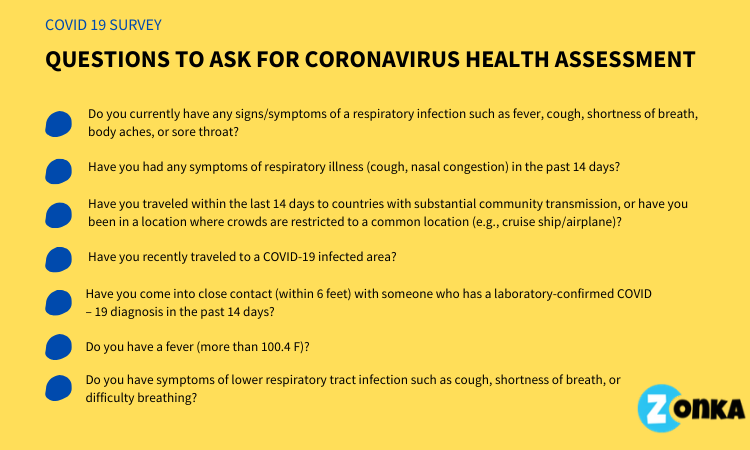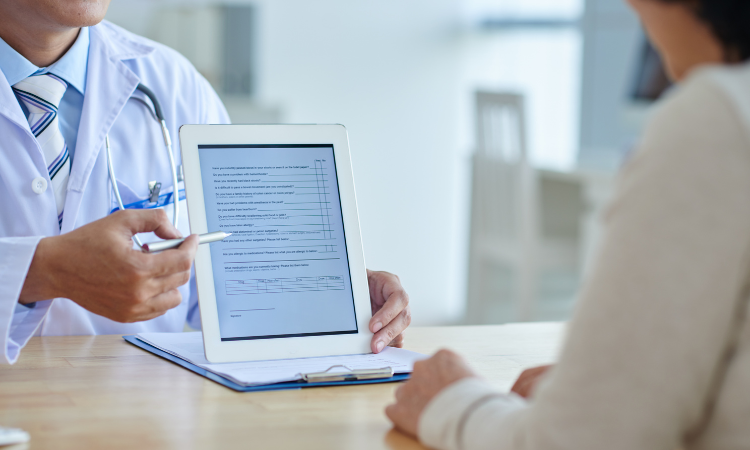Too many people have died after contracting the novel Coronavirus (COVID-19) disease worldwide. The dreadful outbreak continues to spread globally with no signs of abating. The virus was originated in Wuhan, China has spread to at least 131 countries. WHO (World Health Organization) has declared COVID-19 (Coronavirus Disease) as global pandemic disease. It has now become a public health emergency concern at the international level killing more than 3,00,000 people and resulted in more than 17,000 deaths. Governments of most of the countries have shut their borders and have imposed travel bans.
In such tricky situations, it’s difficult for hospitals and health systems to deal with a massive influx of patients. Performing Healthcare Assessment Surveys before taking in patients for a check up can be helpful in sorting patients based on their symptoms and travel history.
Measure Patient Feedback and Satisfaction👩⚕️
Create your healthcare surveys and questionnaires and gauge feedback from patients in real-time.

Hospitals and Clinics can set up Patient Surveys on Email, SMS or Tablets to administer short healthcare assessment surveys to ask patients questions about their condition, symptoms and travel history. The objective of these surveys is to help you assess the health of your patients, specific symptoms of the acute Coronavirus, know their travel history, and ultimately provide assistance in determining patients with the novel Coronavirus.
Important Coronavirus Questions to include in a Health Survey for Patient Assessment
Apart from observing the symptoms mentioned above, it’s always recommended to ask your patients the below set of questions. These elementary questions can be a part of a patient survey which can be created with the help of Patient Survey Software. It will help healthcare providers analyze the seriousness of patients' conditions based on their symptoms and travel history prior to conducting the COVID 19 test.

Question 1
Do you currently have any signs/symptoms of a respiratory infection such as fever, cough, shortness of breath, body aches, or sore throat?
- Yes
- No
Question 2
Have you had any symptoms of respiratory illness (cough, nasal congestion) in the past 14 days?
- Yes
- No
Question 3
Have you traveled within the last 14 days to countries with substantial community transmission, or have you been in a location where crowds are restricted to a common location (e.g., cruise ship/airplane)?
- Yes
- No
Question 4
Have you recently traveled to a COVID-19 infected area?
- Yes
- No
Question 5
Have you come into close contact (within 6 feet) with someone who has a laboratory-confirmed COVID – 19 diagnosis in the past 14 days?
- Yes
- No
Question 6
Do you have a fever (more than 100.4 F)?
- Yes
- No
Question 7
Do you have symptoms of lower respiratory tract infection such as cough, shortness of breath, or difficulty breathing?
- Yes
- No
Here are what you need to know about the illness, how to stay safe, and what hospitals can do to combat this virus:
What are the symptoms for Coronavirus?
According to WHO, common signs of infection consist of:
- Acute Respiratory Problems
- High Fever
- Cough
- Tiredness
- Aches and Pains
- Shortness of Breath
In extreme cases, the deadly infection can even cause kidney failure, pneumonia, and in worse cases, it can also cause death.
How Coronavirus spreads?
The best way to prevent this deadly illness from spreading is by avoiding getting exposed to this virus. It spreads mainly:
- When infected people get in contact with other people
- Transfer of respiratory droplets from nose or mouth, when an infected person sneezes or coughs
- When you meet someone who is infected with the virus and shake hands with them. Afterward, the virus would be transferred to your hands, and if you would touch your mouth or nose, then it would travel into your body
How to Protect Yourself?
- Wash your hands: Wash your hands with water and soap for 15 secs after shaking hands with someone, coughing, or sneezing.
- Make use of Sanitizer: Use a hand sanitizer that consists of more than 60% of alcohol.
- Avoid Close Contact with Infected People: Maintain a distance(as per WHO, maintain a minimum of 3 feet distance) from people who are infected with the COVID-19 virus.
- Cover Your Mouth and Nose: If you are sneezing or coughing, then cover your mouth with the help of tissue or your elbow. Wash or sanitize your hands immediately after it.
- Wear a Facemask: If you are traveling or moving in a crowded place or want others not to get infected from you, then cover your face with a mask. If you are infected, then the virus will not be transferred to other people.
- Clean and Disinfect Areas: Make sure to clean surfaces of objects like desk tables, chairs, phones, laptops, toilets, doorknobs, etc with water and soap prior to disinfection. For disinfection, make use of EPA-registered household disinfectants or alcohol solutions with at least 70% alcohol concentration.
Dealing with any illness can be a complex process. The panic situation arises in case of a lack of information and understanding. The best thing is to be prudent in our actions to avoid spreading any viruses and make a smart decision to build a robust immune system and help the healthcare system as effectively as we can.
By implementing Patient Surveys, healthcare centers and hospitals can get help in documenting patient health, assessing their current condition, symptoms and travel history, and quick the process before conducing the COVID 19 test.
Stay safe and stay indoors!











